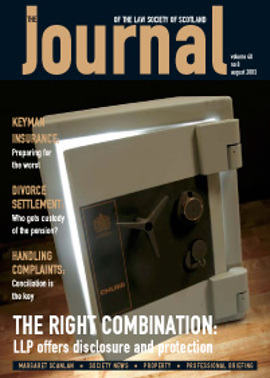Privacy v expression: battle of Convention rights
In the last year, a number of cases involving celebrities, newspapers and magazines have brought to the fore the question of whether we need a specific privacy law to protect the rights of individuals. In every one of these very high profile cases, a counter argument of the right to freedom of expression has been advanced and it is this battleground which may re-shape the way in which our daily news is investigated and reported, as well as the way in which celebrities live their day to day lives.
It is uncertain whether Lady Archer, who won a wide-ranging injunction against her former employee for exposing details of her private life, Mr & Mrs Michael Douglas, who won a substantial and very public battle against Hello! magazine for publishing unauthorised photographs of their wedding or Sara Cox, who won an out of court settlement from Mirror Group Newspapers, for publishing topless photographs of her on honeymoon, would argue that statutory intervention is required. After all, they succeeded in court actions without any specific privacy law – at least not of the type alluded to by MPs, or even suggested by Justice Lindsay in the Hello! case, when he stated:
“So broad is the subject of privacy and such are the ramifications of any free-standing law in the area that the subject is better left to parliament,” adding, “A judge should therefore be wary of doing that which is better done by parliament. That parliament has failed so far to grasp the nettle does not prove that it will not have to be grasped in the future... A glance at a crystal ball of, so to speak, only a low wattage, suggests that if parliament does not act soon the less satisfactory course of the courts creating the law bit by bit at the expense of litigants and with inevitable delays and uncertainty, will be thrust upon the judiciary”.
In each of these cases, either existing confidence laws or the PCC code have been sufficient to enable the courts to decide in favour of the individuals over publishers.
That is not to say that a privacy law will not be enacted, but, equally, the courts have also found in favour of media organisations who have been subjected to litigation by private individuals under ‘privacy’ laws. One need only ask Gary Flitcroft, the footballer, who was exposed by a newspaper for infidelity (but only after Lord Woolf and the Appeal Court decided that the paper’s right to freedom of expression outweighed Flitcroft’s in circumstances where he had engaged in an affair in public places). The same could be applied to Jamie Theakston, who failed to ‘gag’ a newspaper from exposing that he had visited a brothel. Naomi Campbell is currently engaged in an appeal to the House of Lords over a decision by the Appeal Court which upheld The Mirror’s right to publish her coming out of a Narcotics Anonymous meeting. The basis for the decision appeared to be based largely on Ms Campbell’s dishonesty and general conduct.
In Scotland, while we have not had the profile of the above cases, questions of freedom of expression have been raised in courts and Tribunals – but not in cases involving characters from Take the High Road or members of Deacon Blue. Instead, the ECHR’s influence has been used for a number of challenges to court or Employment Tribunal orders to gag the reporting of proceedings. In the criminal courts, cases such as the appeal of Kim Galbraith and the trial of William Beggs were only reported after successful media challenges. These challenges have extended to Employment Tribunals in which a proposed restricted reporting order sought by a Trade Union official, who wished the proceedings to remain private, was refused. The legal basis for these decisions was the court’s recognition of the media’s right to freedom of expression.
It will be interesting to see whether, in the next year, the courts will develop a clearer jurisprudence which would effectively codify a privacy law in the UK. The appeal in the Hello! case will no doubt play its part, but some may argue that, by clause 3 of the PCC code of Practice, by Article 8 of ECHR and by the apparent reference of other traditional legal rights, such as the common law right of confidence, that we already have a privacy law in this country. The fact that awards of damages have already been made may answer the question. What the cases have taught us is, however, an age old lesson in law: each case will be decided upon the facts and the conduct, credibility and reliability of pursuers, defenders and witnesses alike will always have a significant bearing on the outcome.
David McKie is a partner and member of the media department of Levy & McRae in Glasgow.
In this issue
- Summertime and the living is easy
- Merits of modern partnership structure
- LLPs and PII – frequently asked questions
- Always protect your partnership in times of crisis
- A decade of disputed advice
- Far-reaching financial consequences of flawed agre
- How to make client care programmes work
- Winning the game of risk
- Cut down on account preparation time
- Mental health database
- New complaints handling system at the Society
- Muddying the waters on admissibility of hearsay ev
- Conveyancers must be aware of changes to stamp dut
- Employment briefing
- Privacy v expression: battle of Convention rights
- New protocol is major step forward on child abduct
- Website reviews
- Book reviews
- Difficulties of descriptions of exclusive garden
- Checklist for stamp duty applications






